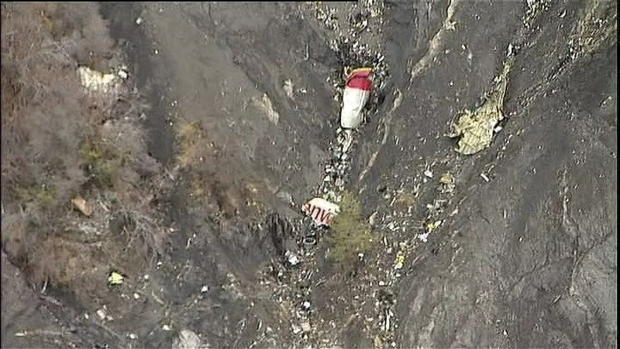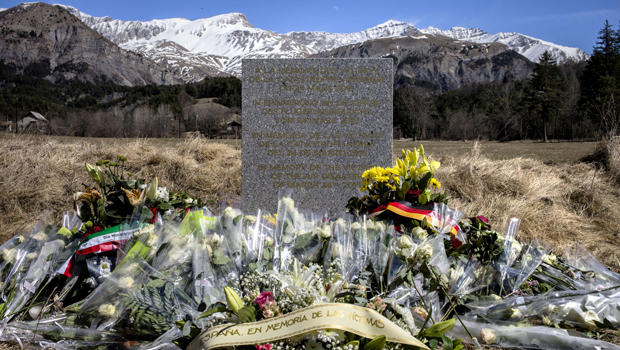Identifying victims in French Alps crash a challenge
French police working to recover remains from the Germanwings crash site say so far they have recovered between 400 and 600 pieces of remains from the 150 people who died in Tuesday's plane crash.
Speaking from the French Alps town of Seyne-les-Alpes, Col. Patrick Touron of the gendarme service said "we haven't found a single body intact."
He also said DNA samples have been taken from objects provided by the victims' families - such as toothbrushes - that could help identify the victims.
Touron also said jewelry and other objects could help in the identification process.
Prosecutors said Friday that co-pilot Andreas Lubitz appears to have hidden evidence of an illness from his employers, including having been excused by a doctor from work the day he crashed the passenger plane into the French Alps.
The evidence came from the search of Lubitz's homes in two German cities for an explanation of why he crashed the Airbus A320.
Prosecutors didn't say what type of illness - mental or physical - Lubitz may have been suffering from. German media reported Friday that the 27-year-old had received treatment for depression.
Duesseldorf prosecutors' office spokesman Ralf Herrenbrueck said in a written statement that torn-up sick notes for the day of the crash "support the current preliminary assessment that the deceased hid his illness from his employer and colleagues."
Such sick notes from doctors excusing employees from work are common in Germany and issued even for minor illnesses.
Herrenbrueck said other medical documents found indicated "an existing illness and appropriate medical treatment," but that no suicide note was found. He added there was no indication of any political or religious motivation for Lubitz's actions.
Germanwings and its parent company Lufthansa declined immediately to comment on the new information.
Investigators had removed multiple boxes of items from Lubitz's apartment in Duesseldorf and his parents' house in Montabaur, near Frankfurt.
A German aviation official told The Associated Press that Lubitz's file at the country's Federal Aviation Office contained an "SIC" note, meaning that he needed "specific regular medical examination." Such a note could refer to either a physical or mental condition, but the official - who spoke only on condition of anonymity because he was not authorized to release the information, said the note does not specify which.
FBI officials were "engaged" with police and investigators in Germany and France as the crash investigation continues, CBS News has learned.
FBI agents were interviewing people that Lubitz may have known while he was receiving flight training in Goodyear, Arizona, officials told CBS News. No significant U.S. assistance has been sent to France, which has not asked for any specific help.
Neighbors described a man whose physical health was superb.
"He definitely did not smoke. He really took care of himself. He always went jogging. I am not sure whether he did marathons, but he was very healthy," said Johannes Rossmann, who lived a few doors down from Lubitz's home in Montabaur.
German news media painted a picture of a man with a history of depression who had received psychological treatment, and who may have been set off by a falling out with his girlfriend. Duesseldorf prosecutors, who are leading the German side of the probe, refused to comment on the anonymously sourced reports, citing the ongoing investigation.
Lufthansa CEO Carsten Spohr said there was a "several-month" gap in Lubitz's training six years ago, but would not elaborate. Following the disruption, he said, Lubitz "not only passed all medical tests but also his flight training, all flying tests and checks."
The U.S. Federal Aviation Administration had issued Lubitz a third-class medical certificate. In order to obtain such a certificate, a pilot must be cleared of psychological problems including psychosis, bipolar disorder and personality disorder "that is severe enough to have repeatedly manifested itself by overt acts."
The certificate also means that he wasn't found to be suffering from another mental health condition that "makes the person unable to safely perform the duties or exercise the privileges" of a pilot's license.
Experts say it's possible that someone with mental health problems could have hidden them from employers or a doctor without specialist training.
"It's a high-stakes situation for pilots because they know if they give the wrong answer, they could lose their license," said Dr. Raj Persaud, fellow of Britain's Royal College of Psychiatrists. "A very good psychologist or psychiatrist who spends in-depth time with him would be able to pick up (a problem), but you have to throw an awful lot of resources at it to do that and often, I don't think (pilots) are getting in-depth assessments," Persaud said.
The president of the German pilots union Cockpit said medical checkups are done by certified doctors and take place once a year.
"At the moment all the evidence points clearly in one direction and it's the most likely scenario, there's no doubt about that," Ilja Schulz told The Associated Press. "But all the pieces must be put together to see whether there were any other factors that played a role, or not. Only then can you draw lessons that will improve security in future."
French investigators, who are in charge of the probe into the plane crash, believe the 27-year-old locked himself inside the cockpit and then intentionally smashed the Germanwings plane into a mountainside on Tuesday during a flight from Barcelona to Duesseldorf.
People in Montabaur who knew Lubitz told AP they were shocked at the allegations that he could have intentionally crashed the plane, saying he had been thrilled with his job at Germanwings and seemed to be "very happy."
Germanwings, a low-cost carrier in the Lufthansa Group, said it was setting up a family assistance center in Marseille for relatives of those killed in the crash.
"In these dark hours our full attention belongs to the emotional support of the relatives and friends of the victims of Flight 9525," Germanwings CEO Thomas Winkelmann said in a statement.

